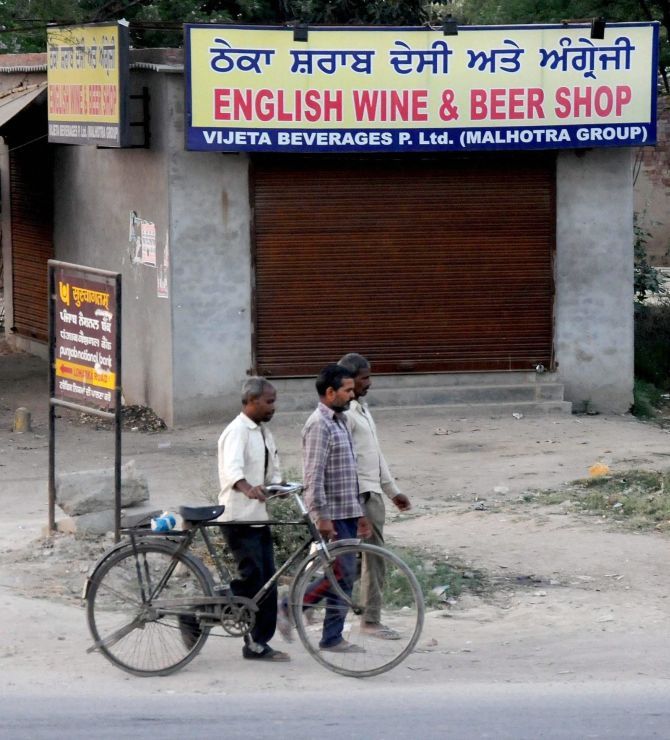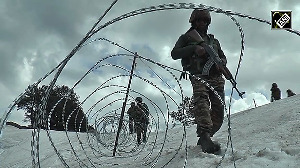
The tourism ministry will seek legal suggestions to explore a ‘middle path’ to solve problems being faced by hoteliers and restaurant owners following the apex court's order banning liquor sale along highways.
Union Tourism Minister Mahesh Sharma, however, said the government will work within the framework of the directives of the Supreme Court in the matter.
He said this today after a delegation of hoteliers and restaurant owners met him in New Delhi on the issue of the Supreme Court’s order that liquor vends within 500 metres of national and state highways will have to be shut down from April 1.
This order is also applicable to bars, pubs and restaurants serving liquor, which give rise to drunken driving and consequential fatalities.
“We respect the Supreme Court order. We will take suggestions from legal experts to see whether there can be a middle path,” Sharma said.
He, however, said the matter is a state subject and any decision regarding it will be taken by the state government.
“We will refer the problems being faced by the hoteliers and restaurant owners, due to the ban, to the states and it is for them to take necessary actions,” the minister said.
The Supreme Court on March 31 had modified its order reducing the distance to 220 metres in areas having a population of up to 20,000. This criterion is also applicable to hill states like Sikkim, Meghalaya and Himachal Pradesh.
Thousands of restaurants, liquor vends and bars, including those in five-star hotels, along national and state highways have been stopped from serving alcohol since Saturday.
Meanwhile, the affected hotel, bar and restaurant owners in Punjab, Haryana and Chandigarh are pinning hopes on the respective state governments to save their trade.
The owners have alleged that the order would result in massive unemployment and financial loss to the state exchequer. They, however, ruled out approaching the court to seek a remedy in the issue.
“Around 25,000 people will be jobless in Haryana alone because of the ban on serving liquor (within 500 metres of highways),” Hotel and Restaurant Association of Haryana president Manbeer Chaudhary said.
“The tourism sector in the state will be most affected. Besides, the state revenue will also be badly hit,” he said.
Terming the matter as a ‘mammoth problem’, Chaudhary said that the respective state governments should pitch in and save their livelihoods.
“We have decided that we will not approach the judiciary for any legal remedy,” he said, adding that it is the government which has many options to bring relief to the traders.
The HRAH representatives also met Haryana Excise and Taxation Minister Captain Abhimanyu and apprised him of the situation.
“The minister was very positive and asked us to give a representation in this regard, which we have already done,” Chaudhary said.
“In our representation, we have told the government to take a stand in the apex court as excise is a state matter, and states should have been consulted before passing any judgment,” he said.
The HRAH chief further said that there were several cities in Haryana having bypass, and that there was no meaning of state highways.
He said that the immediate fallout of the ban has come in the form of cancellation of rooms by tour operators, causing massive loss to the hotel industry.
“Out of 478 bars in Haryana, 194 bars will be affected by the Supreme Court order and most of them are situated in Gurugram,” he said.
In Punjab, the representatives of Punjab Hotels Association termed the ban as ‘great setback’ for the hospitality sector and urged the Congress-led state government to change the nomenclature of highways.
“We have requested the government to change the nomenclature of state highways to district roads. It will bring relief to at least 60 per cent of the affected hotels, bars and restaurants,” said Punjab Hotels Association president Satish Arora.
“We have also urged the Punjab government to file a review petition in the Supreme Court against this order,” he said.
The association said that the affected hotels, restaurants and bars should have been given at least two years time to dislocate.
Meanwhile, in joint capital Chandigarh, a large number of representatives of affected hotels, bars and restaurants along with their staff today took out a rally against the order.
“Banning liquor on highways is no solution. Drunkards can still travel on the highways after having drinks at bars located far from the highways. Then, what purpose will this ban serve?” Vinod Dua, owner of Peddlers bar and restaurant, asked.
“We have given a representation to Chandigarh Administrator V P Singh Badnore, demanding that the highway on sector 25, 35, 43 and the industrial area be declared district roads,” he said.
Notably, the UT administration had denotified V1, V2 and V3 roads to save the liquor vends there from closure due to the ban.
The Supreme Court has in a recent order said that liquor vends within 500 metres of national and state highways will have to shut down from April 1.
In Maharashtra also, the members of the Hotel And Restaurant Association of Western India will take up the issue with Chief Minister Devendra Fadnavis.
“We will be meeting the chief minister tomorrow (Tuesday) to discuss the impact of liquor ban on employment and other issues related to the industry,” HRAWI President Dilip Datwani told said.
Maharashtra has 13,655 bars and shops, with over 500 affected ones are in Mumbai alone, said former president Kamlesh Barot of the Federation of Hotel and Restaurant Associations of India.
He said, “In Mumbai metropolitan region alone over 2,000 bars and restaurants are on the verge of closure while 9,925 face the risk across Maharashtra.”
“The state government will lose over Rs 7,000 crores in taxes, excise and license fees, while the country-wide impact on the sector is estimated at Rs 2,00,000 crore," Barot added.
This would be in addition to an estimated job loss of over one million heads currently employed in the hospitality sector.
Datwani said, unlike many other countries, the highways run right through the cities and towns in India with many bars and restaurants, hotels, malls, cinema halls, clubs and even residential apartments existing right next to the highways.
"About 50 star rated hotels in Mumbai are also expected to be affected by the ban and tourists may find themselves exposed to a scenario of severely shrinking choices," he said.
This will wreck the demand supply ratio of full service hotels in the city, and affect the tourism infrastructure, he added.
IMAGE: A closed liquor shop near a highway in Amritsar. Photograph: Shiva Sharma/PTI Photo











 © 2025
© 2025